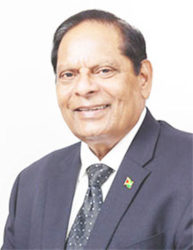Opposition Leader Bharrat Jagdeo has claimed that planned amendments to the Integrity Commission Act to include the proposed Ministerial Code of Conduct aims to place members of the executive in charge of enforcing the legislation but Prime Minister Moses Nagamootoo has refuted it.
According to Nagamootoo, under the current law, it is the executive which has the right to discipline ministers and the amendment does not change this.
Speaking at a dinner held by the Guyana Manufacturers and Services Association (GMSA) last Friday, Jagdeo said that he was very uncomfortable with statements he was hearing and the actions of the government in relation to transparency and accountability. “We have to toughen our integrity legislation,” the former head of state told those gathered at the Pegasus Hotel before accusing the APNU+AFC government of attempting to weaken the legislation. “They have dissolved the commission and disbanded the staff. So we don’t have an Integrity Commission and government just came out with an amendment to the legislation to include a code of conduct for ministers and parliamentarians. I saw that amendment coming up and its enforcers are the President and Vice-Presidents. The executive,” Jagdeo said.


He lamented that the amendment will remove the enforcement abilities from the Integrity Commission—a separate agency—and put it in the hands of the executive.
Nagomootoo told Stabroek News yesterday that he had circulated the proposed amendment to Jagdeo, the Guyana Human Rights Association and other organizations concerned about governance for comment but said he could not see how it would alter the powers of the commission. “I don’t see how the amendment will change what was there before. We have tried not to create new functions for the President, so it grants no new powers. I will have to wait until he [Jagdeo] responds to my letter before I can comment on his position. I have given him 14 days to examine the amendment and offer his suggestions,” Nagamootoo explained.
He directed Stabroek News to the 1997 Act, which at Section 31 (4) states that the Integrity Commission… may transmit where the circumstances warrant a report to the relevant authority charged with the exercise of disciplinary control over the person against whom a complaint of breaching the code of conduct has been brought for whatever action that body may think necessary.
The same section charges the commission with submitting reports to the President and the Director of Public Prosecutions, who can, if the situation warrants, institute charges.
Nagamootoo maintains that none of this will change; rather, all that will happen is the new Ministerial Code of Conduct will be added as a schedule to the law. “The Integrity Act as exists has a code of conduct which stipulates minimum requirements of persons in public office. The amendment is seeking to expand on the code and to treat the code as a schedule to the Act, which requires that it be taken to Parliament via an order,” Nagamootoo explained.
He added that the Integrity Commission has no power to fire a minister as that power lies with the President, while the Minister of State and the Public Service Commission have responsibility for all other persons in public office.
The commission came into being as a result of the Integrity Commission Act 1997, while the first set of commissioners was appointed in 1999.
The re-appointment of the commissioners was a cause for concern to then Leader of the Opposition Robert Corbin, who took legal action in May, 2005 to nullify the appointment of the Chairman and members of the commission, while arguing that the president did not consult him, and that the appointments were made arbitrarily and unconstitutionally as they were in breach of the constitutional provision that provides for the leader of the opposition “to express a considered opinion on the appointment of the Chairman and members of the Integrity Commission.”
Following the resignation of Bishop George, Dr James Rose had been nominated by the government to be chairman but he subsequently withdrew his name after the opposition parties raised concerns.
The code of conduct was promised by the coalition government, which had committed to get it done within the first 100 days in office. It was promised that the code would be established for parliamentarians, ministers and others in public office to abide by and this would include mechanisms for demitting office due to violations.




